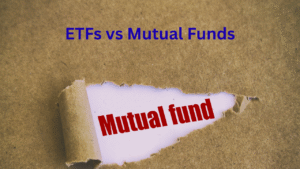 ETFs vs Mutual Funds: Key Differences Explained
ETFs vs Mutual Funds: Key Differences Explained
Category: Stock Market Explained
If you’re looking to diversify your investments without picking individual stocks, you’ve probably come across ETFs and mutual funds. Both are popular investment vehicles that pool money from many investors to buy a diversified set of assets.
But while they share some similarities, ETFs and mutual funds differ in how they’re managed, traded, and taxed. Choosing the right one depends on your investing goals, preferences, and experience.
What Is an ETF?
An Exchange-Traded Fund (ETF) is a type of investment fund that holds a collection of assets—like stocks, bonds, or commodities—and trades like a stock on major exchanges.
✅ Key Features:
- Trades throughout the day like a stock
- Usually passively managed (e.g., tracks an index like the S&P 500)
- Lower expense ratios
- Transparent holdings—updated daily
Example:
SPDR S&P 500 ETF (Ticker: SPY) tracks the S&P 500 index and lets you invest in 500 top U.S. companies with a single purchase.
What Is a Mutual Fund?
A mutual fund pools money from many investors to buy a portfolio of assets. It’s typically actively managed by a fund manager aiming to beat the market.
✅ Key Features:
- Trades once per day after the market closes
- Often actively managed
- May have higher fees and minimum investment requirements
- Holdings updated quarterly
Example:
Fidelity Contrafund (Ticker: FCNTX) is a well-known actively managed mutual fund focused on long-term capital appreciation.
Key Differences: ETF vs Mutual Fund
| Feature | ETF | Mutual Fund |
|---|---|---|
| Trading | Intra-day on stock exchanges | Once daily after market close |
| Management Style | Typically passive | Often active |
| Fees | Lower (0.03%–0.50%) | Higher (1%–2% or more) |
| Minimum Investment | Low (price of 1 share) | Often $500 to $3,000+ |
| Tax Efficiency | More tax-efficient | Less tax-efficient (more capital gains distributions) |
| Transparency | Daily disclosure of holdings | Quarterly disclosure |
When Should You Choose an ETF?
- You want lower fees
- You prefer real-time trading
- You’re building a DIY portfolio
- You want more control over buying/selling
ETFs are excellent for passive investors and cost-conscious individuals.
When Should You Choose a Mutual Fund?
- You want professional management
- You don’t need real-time trading
- You’re investing through 401(k) or IRA accounts
- You prefer hands-off investing
Mutual funds can be ideal for long-term investors who want a managed experience.
Tax Considerations
ETFs are generally more tax-efficient than mutual funds due to a mechanism called in-kind creation/redemption, which helps minimize capital gains distributions.
Mutual funds, on the other hand, often pass capital gains to shareholders, which can create unexpected tax liabilities—even if you haven’t sold your shares.
Fees: A Major Factor
- Many ETFs have expense ratios under 0.10%.
- Actively managed mutual funds may charge 1.00% or more, plus load fees (sales commissions).
Always check the expense ratio—a small percentage difference can significantly impact long-term returns.
✅ FAQ: ETFs vs Mutual Funds
1. Can I invest in both ETFs and mutual funds?
Yes! Many investors use a mix. For example, they might use ETFs for core holdings and mutual funds for targeted strategies.
2. Are ETFs riskier than mutual funds?
Not inherently. Risk depends on the assets held. ETFs may feel more volatile due to real-time trading, but they can be just as safe or risky as mutual funds.
3. Do ETFs pay dividends?
Yes. If the underlying holdings pay dividends, ETFs typically pass them on to investors, either as cash or through reinvestment.
4. Can I set up automatic investments in ETFs like I can with mutual funds?
It’s possible, but not as seamless. Mutual funds usually support automatic investments. Some brokers offer fractional ETF shares to make this easier.
5. Which is better for beginners?
ETFs are great for beginners due to their low costs and ease of access, especially through apps like Robinhood or Fidelity. Mutual funds may be better in retirement accounts or for those preferring a managed experience.
✅ That wraps up the 10-part blog series for your new category: Stock Market Explained on stockmarkettermsglossary.com.
Would you like these compiled into a single document for easy upload or editing?
